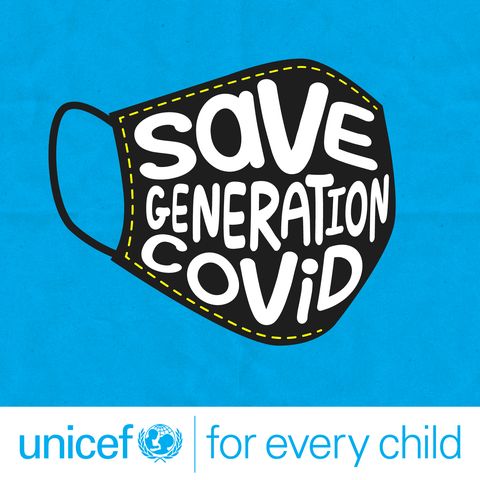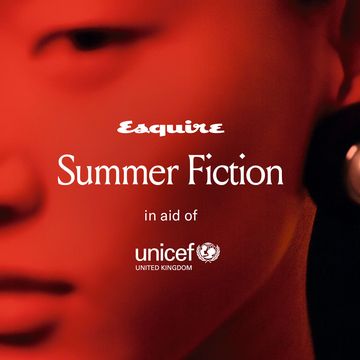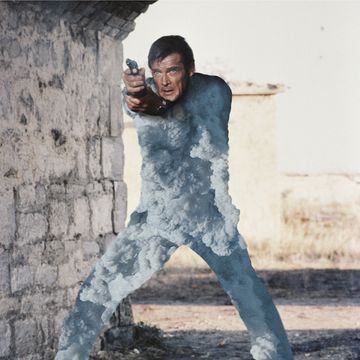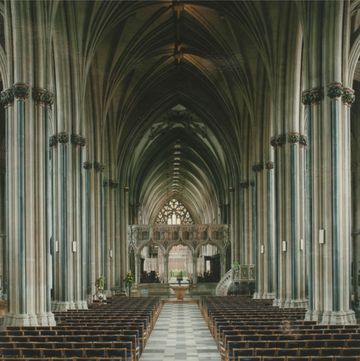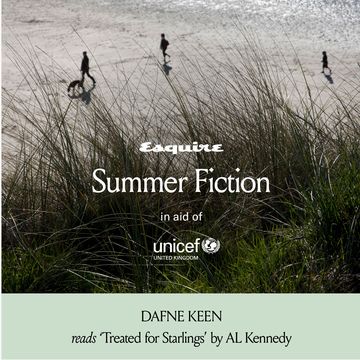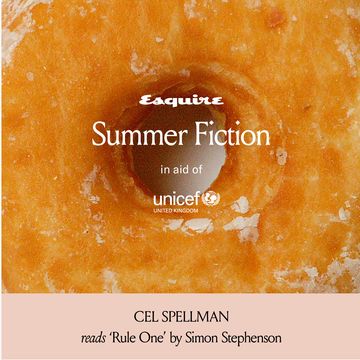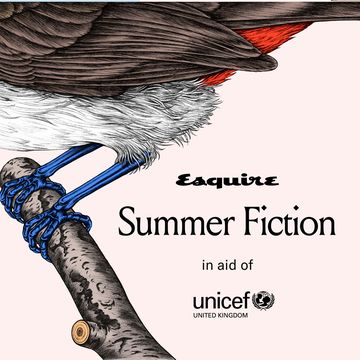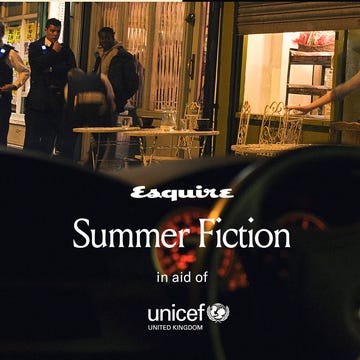Esquire's Summer Fiction series, in aid of Unicef UK, brings together some of the world's finest writers, and greatest actors, for a collection of original stories and readings that offer, we hope, a ray of light in these dark times, as well as the chance to raise funds for Unicef's Generation Covid campaign. (Read Unicef ambassador and Esquire editor-at-large Andrew O'Hagan's piece on why the campaign is so vital here).
Where a child is already experiencing hardship, outbreaks of diseases bring a new emergency to an already precarious situation. This is the story of Generation Covid. For vulnerable children all over the world, it poses the biggest threat since the Second World War. Please enjoy these stories, then visit Unicef UK's Generation Covid page to donate.
DONATE NOW
Audio: read by Jenna Coleman
To listen, click 'Unmute' in the video at the top of this page. Alternatively, listen and download on SoundCloud, or listen on YouTube.
'Pressures, Residential' by Philip Hensher
From: Pippa Winton notreallyacunt85@swiftmail.com
To: George GPD2017@guardiansolutions.com
CC: Di Browning dianabrowning@longstaffbrewer.co.uk
Hi George!
This is my monthly email, the one that you asked me to send, letting you know that everything’s OK. I’m actually writing it a few days early. I’m supposed to send it on the first of the month, I know. That’s Friday this week. I’m writing it today, which is Tuesday. It doesn’t look as if I’m going to be in a position to send it today, but I might as well write it now that it looks as if I’ve got some time on my hands. I am going to tell you that everything is OK, just as we both were hoping.
I’m writing it in Word. I don’t have any wi-fi where I’m writing. Other people’s accounts are showing up — VM9704322, SKYE4123, those sort of anonymous ones, and one called Jim’s iPhone, which comes and goes. They all have a padlock shown by them, and I can’t guess what VM9704322 used as a password and I don’t know who one-bar Jim is. He might be your guardian in the next building, the one with the yellow-gold hat on top. The only wi-fi in the building I can use is the one in the lobby, and that’s 39 storeys down and not showing up at all. So, I’m going to write this like this, on a word processing program, and by Friday 1st, I’ll be able to go down to the lobby, log into the wi-fi with the password that Kofi the security guard gave me, and cut and paste this into an email. I hope I’ll be able to.
Sorry if Kofi wasn’t supposed to hand out the password. I sort of talked him into it. Don’t sack him, George. I know you will.
This will be my fifth email along these lines, and the first time I’ve hit a snag, so I think I’m due a bit of slack. I don’t know if you remember when we agreed about these emails. You were probably talking to one would-be tower guardian after another that week. We’ve never met since. You might not have a clear memory of me, though I must have made a good enough impression. Towards the end of the conversation, sitting at the table in apartment 306, in the first tower, the one with the unlucky blue stripe at the North and South corners, you said, “It would be great if you could just send me an email, once a month or so.” You had turned off all the taps by then and it was quiet again.
“That’s not a problem,” I said.
“Letting me know that everything’s OK,” you said.
I didn’t see why not. “Of course, if there is an issue of any sort, you’re going to get in touch straight away,” you said. “Especially with the plumbing. That’s a real concern.”
“I’ll follow the instructions to the letter,” I said. I had put on my most good-girl interview suit and a City solicitor-ette blouse I’d stolen from Di on my way out of her house. You probably thought I was the letter-following type.
“Once a month or so,” you said. “Let me know there’s been no problems in May and I’ll be able to show that to people, set their minds at rest. Investors. Insurance. You know.”
“Once a month or so,” I said, making a professional note.
“On the first of every month,” you said. “Shall we agree on that? First of the month, without fail.”
I understood then that what you meant by the words “or so” was not what most people meant. You meant that you were, in your eyes, a nice guy, a relaxed sort of guy, and everyone you met must accept this and do precisely what you told them to do. “Send you… an email…” I wrote in my new, small notebook with the Bic biro I’d bought for this meeting. That must have impressed you, too. “…The first of the month… confirming no problems in previous… month.” I looked up at you. “No problems with the building, you mean,” I said. “Yeah, with the building, of course,” you said. “What else did you think I could mean?”
I didn’t really think that you could be asking me to tell you the problems that I had had in the last month. They had looked pretty bad. I didn’t have a girlfriend any more. The week before, Di had led me from one room in her house to another. Every room I had anything to do with was, it’s true to say, a total disaster. There were beer cans under the coffee table in the lounge that had been there since the weekend. There were cigarette burns on the worktops in the kitchen the length of my finger where I’d just put a fag down and forgotten about it. We went into the garden. I had been going to dig it up and plant it. Maples and bamboo. Japanese. It was nothing but knee-high weeds, two rotting bicycles on their sides, their handlebars twisting skywards as if begging for help, and a field of green bottles that someone ought to do something about.
Then Di led me back into the house and into the room I never went into. It was her study. It was full of stuff – files, books, computers and printers, everything she needed – but all in order, on shelves, lined up, ready. Her stuff was as tightly organised, clean and neat as a new box of chocolates.
Di didn’t need to say very much. Also, for the last six months, I’d been seeing her boss. There are ways of ending a relationship through agreement, but the words, “Just sod off out of my house and never come back. I want you out within an hour” aren’t a good start to any negotiations. That bit was quite straightforward. I understand that Di getting Caroline relocated to the Frankfurt office took a bit more effort. Caroline was her boss, who I haven’t heard from and don’t expect to. Di can be pretty frightening, when she wants to be, which is always.
So, because of not having a girlfriend I didn’t have anywhere to live. The three-storey house that had come with the girlfriend had its locks changed. And, of course, there was the other thing I didn’t have, any money. I hadn’t had a job since I met Di. I had just stayed at home buggering up her house.
A week after she’d kicked me out, she sent me a text message. By that time I’d moved on from Sue and Andi’s spare room to Bill’s sofa and then to the back bedroom in Catriona’s place, where I could stay until Kath got back from some academic conference in Kidderminster. (That was a stroke of luck; I wouldn’t have been allowed past the front gate if Kath had known anything about it.) Di’s text messages went like this — you don’t need to see what I wrote back.
Hey.
Nice. Well I’ll ignore that because I’m going to help you out in fact.
No, I’m not having second thoughts. We’ve got this client.
It’s one of those property developers. Built seven residential towers along the river. You know, the ones up from the power station.
Needs someone to live in them. He’d pay you. No rent or anything.
There’s no catch. Why would there be? Christ, I give up.
OK. I’m just passing this on. If you meet with their guy he can explain. I’ll drop him a line and you follow it up. I’m not going to tell him you were my girlfriend. Keep it professional.
I’m not starting this again. His email is GPD2017@guardiansolutions.com and his name is George. It’s actually just the developer — that’s not their main address, just the one they’ve asked me to use for this. Up to you. Try not to destroy all his apartments. He’s only just built them.
So I’m sorry, George, that I didn’t let on that your lawyer was my ex, that she was doing me a final favour, and that when she said in her email that she knew I was a reliable, responsible and good-tempered individual she was lying through her teeth. Sorry about that.
I spent a day thinking about it. No, that’s not quite right. I spent a day thinking about her. This had to be some way Di had found to completely bugger me up. I was sure of it. “Maybe if you let me stay here,” I said to Catriona. “It won’t be so bad. I’ll just go out for a long walk before Kath comes home, and you just explain my situation, and how I’m very sorry for what happened, and maybe I could go on staying very quietly for a few…”
“You’re out of your mind,” Catriona said. “You’ve got to be out of here tomorrow.”
So, I sent you an email. You’re efficient, George, I will say. Fifteen minutes later I get your response, and I’m to meet you at 6.30 at a bar near the development. I knew the bar. It was on a permanently moored boat, an old working boat of some sort. It had been there for years. Di and I used to go there when we wanted a drink somewhere quiet. That stretch of the river never used to have anything much along it. You could rely on getting a table on the deck, even on a Friday night. The boat had stayed where it was, still scruffy, a few straggly pots of red geraniums, the wall behind the bar still pinned with an exotic range of banknotes for some reason.
Around it, tower blocks had gone up, quite suddenly, and the deck of the boat didn’t bask in the sun any more. The shadow of a long line of residential developments, a wall of glass and steel and money, fell on it. I was 10 minutes early, in my responsible-person suit, and I was drinking something that could have been sparkling water. Hundreds, perhaps thousands of new apartments were within 10 minutes’ walk of this bar, and yet it was, just as before, completely empty.
You walked up the gangplank and towards me without hesitation. I recognised you, too. I had never seen you before, but I had seen you a thousand times. What had your grandfather been, and where? He had stunk all his life, had stolen goats and defrauded outraged housekeepers and burgled outhouses, and he had run for his life across wastes of territory, in what non-abluting landscape — Kurdistan, Azerbaijan, Armenia, Moab — who knows. But you, George, you came up the gangplank in the blue suit and brilliant white shirt that might have been just ironed, the conker-brown shoes and night-black hair shining in the sun like the cliff of windows you had put up behind you.
You came up to the table where I sat and I smelt your delicious freshness of cologne and diurnal showering. Your grandfather’s defrauding smile had been like an archaeological site; your smile was as white and level as a skating rink. I recognised you. I had seen your type a thousand times, and your type was called London, was called property. You had put up those seven towers behind us. They were 40 storeys high. Each had a fanciful swirl of a party hat on top, each in a different colour.
“The architect had the idea of the crown and the stripe at the north corner and the south corner in seven different colours. Not in order — we didn’t want a rainbow.”
“Would look like a Pride flag,” I said.
“Yeah, exactly,” you said with relief. I was testing; you didn’t know anything about me, or Di, and as they say, in my suit from Next I was passing. “Don’t want that. So we mixed up the order of the colours, red, indigo, green, yellow... sounded like a good idea at the time. Then the apartments go on sale and we can’t understand it. The red and yellow towers sell out in minutes, literally minutes. Red and yellow turn out to be auspicious, that’s the word. The green one slower. A lot slower. Turns out to mean your wife’s playing away, if you’ve got a green hat on. The buyers… Christ, the agents laugh when they see an image of it. The blue tower we’re having to rethink the sales strategy. Our target market won’t go near it. Blue, it’s just bad luck. That architect was an idiot. He knew what the target market was. He could have saved us all this with five minutes on Google.”
“Who have you sold them to?”
“People a long, long way away,” you said. You took a long, judicious drink of your negroni. A red, auspicious cocktail. “You’re never going to set eyes on them.”
“So, you want people like me to live in the towers that haven’t sold. The blue tower. The empty one. You need a property guardian.”
“They’re all empty,” you said. “The blue one’s not sold and the yellow one’s all sold. But they’re both just as empty. If we can’t rip out the blue crown and put another yellow one on top, we’ll rethink the strategy, sell the blue apartments to Russians. That’s not the problem. The problem is what that fucking architect’s landed us in. Property guardian. Yeah. That’s the term.”
You led me to the nearest of the towers, the unlucky blue-striped one. This was the one in which I was to live. You placed your palm on a glass panel by the double-height glass doors and they slid open with a hiss. “They don’t need to make that noise,” you said. “Adds to the whole sci-fi future vibe. They love that, the buyers.”
Inside the lobby, a small man sat behind a wide, blond desk. Behind him, the 30ft wall was an abstract textured azure. You introduced him as Kofi. He is the man you’re about to sack, remember, George? He would help me out, tell me what the amenities are in the vicinity, all that. Kofi smiled at me without saying anything. There was a mechanical juddering in the air, somewhere beyond sound. I could hear the building and feel it. Now I know what it was, I realise that it must have been bad that day, the nightmare I was there to fend off.
There was another glass panel by the bank of lifts, and you placed your hand on it. The doors opened with the same hiss. “Trademark,” you said, meaning the sound. “I mean not trademark literally, but, you know, that’s like the whole experience right there, hssszzzzz, trademark. Impressive. There’s only one thing in the whole building you need a key for,” you said. “I’ll show you later. I don’t understand why. Some health and safety thing that we weren’t allowed to use the hand technology ID for. It’s PalmScan 0.3.”
“Can I use the, what, the hand thing?”
“Add you to the database. Just need to scan your hand. We’ll time-limit it. If we ever need to, we can extend it remotely. If the arrangement comes to a premature end, we can remove you from the database.”
“And I won’t be able to get back in.”
“Here we are,” you said, and we got out of the lift. We entered the first apartment on the right. It was number 306, the sixth apartment on the third floor. You walked straight past all the beige furniture into the kitchen. You turned on the kitchen sink. It roared. You walked back past me into the bathroom and turned on the tap in the sink; you reached into the shower cubicle — there was no room for a bath — and turned on the power shower. The weight of water roared. Were you afraid of some listening device from your employers? You began to explain what it was I was here to do; just how the architects had buggered it up.
Two days later, I was in the lobby. Kofi was on duty again. He had nothing to do all day long. I had wheedled the wi-fi password out of him, and was sitting going through Di’s Facebook profile again.
“Where are you living today?” Kofi said.
“I’m in 2301 today,” I said. “It’s nice up there.” I don’t know why I said this; the first apartment on the 23rd floor was exactly the same as all the others, 42sq m, the same beige sofas, the same power showers, the same coffee machine and even the same forks and knives in the drawers. I had been warned that if ever a buyer, or a buyer’s agent came to see an apartment, they were going to want to buy the whole lot in one go; they didn’t want to be bothered with London furniture shops.
“Does it have a terrace, a balcony?” Kofi said. “I’ve never seen these apartments. My hand lets me into the lobby but I can’t get into the lifts. You, you’re lucky. One of these days, I’m going to buy one of these apartments, live here, wake up, everything in front of me so beautiful.”
“Where are you living?” I said. I wasn’t going to offer to show Kofi the building. He might have been told to test me out.
“I have to share an apartment with my cousin-friend and his three friends,” Kofi said. “South of Croydon, hour-and-quarter to work here. One day, I’m going to live here, though. Those are so beautiful, the apartments with terrace. I hear.”
“It’s only the top three floors that have terraces,” I said. The cheapest of these apartments sold for £1.4m. If you sold them for any less, the purchasers, who needed somewhere to conceal their money, would be put to the trouble of buying two. “I’m saving one of those for the first hot day.”
“Not gonna be hot for months now,” Kofi said. “Everything good? You running taps, shower, like you’re meant to?”
“Yes, Kofi,” I said. “I’m doing just what I’m supposed to be doing. It’s not much to ask.”
These are beautiful buildings. I can admit it, even today as I write, though the sun’s going down and I’m outside on the 39th floor, and have no idea what I’m going to do to get back in. They look wonderful; the next building to mine, with its yellow-gold crown and its yellow-gold stripe, gazes down at London with an imperial command, and its surfaces glitter like the surface of the river at its feet. They are beautiful buildings and running through them is a rotten core: it judders and it shakes; nobody knows what it might do, unattended, and that is what I am here to prevent.
You had explained. The architect had given no especial thought to the plumbing system in the tower. He had ensured that if every inhabitant of every one of the 200 apartments decided to take a shower simultaneously, the force of the water would not fail. But that would never happen, because there was no-one living in the apartments. They were empty, day after day. And the water pipes did not like it. Once, Di and I had gone away on holiday for four whole weeks. We came back, bronzed and fit and hungover, and I went to the kitchen and turned on the tap. That was just one house, and still, after four weeks, the tap juddered without producing anything, and made the casing shake. In a building 40 storeys high, who knew what that judder of disuse could lead to? Kofi took an occasional drink of water from a dispenser; he scrupulously obeyed his original instructions, and went behind the building to use a portable toilet, not more than twice a day. He made no difference to the plumbing.
I lived in these days like a naiad, a water nymph presiding over stopped fountains, the vertical brooks, the blocked cataracts and wells. I woke in whatever apartment I had parked myself in, and before anything, I went from tap to tap, opening up each one: in the kitchen, the bathroom, the power shower; flushing the lavatory once, twice, three times before the roar of H20 clearing out the building’s entrails and intestines and bowels made me too want to piss. I would make my scraggy breakfast slowly out of supermarket rolls and the six complimentary coffee pods that you have placed next to the complimentary coffee machine in each apartment, George.
A few days ago, out of curiosity, I decided to fill up the coffee machine with the complimentary photo-shoot bottle of vodka you’ve placed in each apartment, George. I have been here for some months now; I haven’t got to the end of the building’s coffee pods; the worst I have done is to destroy the coffee machine in, I think, 2804. Di would tell you that if that’s the worst, I’ve done much better than she, or anyone who knows me, would have predicted. Bear that in mind.
I needn’t have told you that. You wouldn’t have discovered the buggered-up coffee machine until long after I had left here, or long after my engagement with you had been terminated. The word “discovered” starts to have a sinister quality. I am typing up here into a void without wi-fi and night is falling. I am starting to feel cold. I will not allow these thoughts to hang around.
I had been saving the top four floors for the first hot days. I didn’t think I would overnight in them. I wanted to keep them absolutely immaculate, untouched. I woke this morning in 1705; I had run the taps for an hour before I had slept, and now, eight hours later, I ran them again for another hour. I’m not supposed to leave this task undone for more than 10 hours, and it’s true that the juddering starts quite soon after that.
I put on a yellow bikini and a pair of sunglasses. I took the single key that the building had a use for, which I had kept safely and never needed until now. I took my old laptop. I won’t explain. You don’t need to know. With a sense of luxury, of being unobserved, I went out into the shared spaces where I had never seen another human being. I took the lift to the 39th floor. My palm print was universal, and it would have opened any of the three apartments on this floor. I went for 3902.
It was dark inside, a crepuscular, thick-shuttered gloom, and the space was cavernous. Or at least it seemed so, after the uniform
42sq m of all the other apartments I had been living in. I shut the door and went through the dusty rooms in which the familiar sofas sat with unfamiliar, solitary grandeur. The long, shuttered, full-length window had a lock by it; I put the key in it, and turned. The steel shutters opened with startling, showy speed. The blaze of London sun, 130m up in the air! I blinked. The terrace was mine for the day.
It is beautiful up here. Your designers had more forethought than the architect; their beige interiors, however neglected and undisturbed, wouldn’t show the accumulation of dust. On the terraces, a line of succulents in pots would survive through London rain and London temperatures; they looked abandoned but not dead. I took my laptop to the waxed-cotton lounger behind the plants. I had something to do.
It was the day before that I had had an email from Di telling me…
No. I’d better not lie. I have improved my life and not burned any holes in your kitchen surfaces, George, and I don’t want to lie to you either. I read a Facebook update by Di announcing that she and Eileen were going to get married. I hadn’t responded to it. Which was, I suppose, a mark of how I’d got myself under control. If that doesn’t encourage a girl to go up to the 39th floor of the tower she’s the guardian of and spend a morning not just tanning herself but typing at full tilt, I can’t tell you what will.
I won’t tell you what I was typing. I’ve never met Eileen, as it happens, but she doesn’t come out of it well. The one thing that I will say for Di is that I could go on reading her Facebook updates. She hadn’t unfriended me or blocked me. I guess she meant that kindly, though I didn’t get a lot of pleasure even now, months later, when I read that she and Eileen had had an amazing fortnight in Japan and looked at the pair of them in front of temples, holding up chopsticks, pointing at gardens, all that shit. Di wanted me to go on being part of her life, or at least to go on being able to look at it. She meant that kindly. I went on typing.
About 12 o’clock, something so strange happened. A noise happened. Not a remote, street-level one, nor an automatic mechanical one, but a nearby sound with a human cause. I was startled; I froze. Then a voice. And another voice, responding — a murmuring voice. I could hear what the first voice, a male voice was saying, but not the second. They came from inside the apartment.
“One-hundred-and-twenty square metres,” the first voice said.
“Unmatched design standards,” it went on.
“Unrivalled,” it said.
“Eleven per cent in the first year,” it said.
“Rental opportunity, which we can handle,” it said.
“Yes, many of our clients feel the same,” it said. “The return on property investment is spectacular enough. If you don’t feel you need the burden of dealing with…”
“And now the terrace,” it said. “This shouldn’t be open. Are you sure? Yes, the heat. It’s just a terrace. The highest design standards. Let’s move on.”
I hadn’t moved. I had thought for a moment that it was you speaking, George. But I don’t think it was you. I think that the person in your organisation that shows potential buyers round is somebody quite different. It can’t be an important job. I had not seen a single potential buyer in all the months I have been living here, guarding, running the water with opulent, unmeasured generosity. The buyers, on the whole, did their business from where they were. They did not need to experience the translation of £1.4m into square metres in person; £3.6m for the apartment outside which I was basking. This was the only way someone like me could find anywhere to live in the city I was born, to run the taps in an empty building where no-one was supposed to endure, or to exist. I had spent most of a year in an airless, moneyed tower, and soon I would have to move on. George, this is the last of my monthly emails to you.
The seller and his client were moving on. I would be left in peace again. But then a key entered the lock. It was turned. With a terrible swiftness the steel shutters descended. By the time I made my first shout, the door to the apartment had been closed. I was alone again. I was on a terrace on the 39th floor of a tower block on the far side of a heavy steel shutter.
I had the key to the lock, but the key that opens and closes it was inside the apartment. I had no telephone with me. My computer had no wi-fi access. The other towers that this tower faces, and which hem it in, were quite uninhabited. Their guardians, if they existed, could be on the third floor, or the 18th, or any other. In the middle of the city I was nearly naked and quite isolated. I had no idea what to do.
This is the predicament I find myself in, George. That was several hours ago. The heat of the day has long gone. It’s night. I am very cold. I am thirsty to a degree that feels dangerous. I’ve kept myself busy by writing this email, the last of my reassuring emails. I am getting near the end now, however. This laptop has three per cent left of its battery, and will soon be dead. I can reassure you that the building is perfectly OK. There is no problem with it.
As for me, I am not very confident that Kofi is going to notice I don’t seem to be around, or that he hasn’t seen me for three or four days. But I am placing a bit of hope in what I know to be a fact. Your handprint technology must record, after all, who comes in and goes out. Someone in your organisation must know that the guardian of this tower entered apartment 3902 some hours ago and has not yet emerged. I still think that your organisation must have some kind of concern for my well-being. And I know how your organisation will be alerted. I have no means now of running water through your poor, pathetic systems, meant for buildings in which people might actually make their lives.
In a few hours, the pressure will start to build. There will be groans, and mutterings, and mechanical moanings as if in grief. I hear it starting already. I hear the shudderings of a sick building in terror; I hear its fever, its inner tumults. It won’t be long, I know. I wish there was some old-style reference book where I could look in the index and find out just how long before something breaks. But it will break. Someone — perhaps even you, George — will come to investigate. I don’t know, now, what that person will find of me. But your systems will ensure that they know where I am.
Philip Hensher says:
“One of the strangest things to happen in my lifetime is the emptying of central London. During the lockdown, I would sometimes go for walks along the river near my house, and see huge new developments dark at night; purchased, but uninhabited. The relationship between a human and the shell it lives in, the property it inhabits, haunts the imagination. When property is unlived in, or even unloved, it gives off a strange, sad aura. Everyone knows the difference between a holiday rental that has been borrowed from someone who lives there regularly, and one that has been furnished in bulk from IKEA, to make money. One day an architect told me that it isn’t just a matter of aura and emotional residue that troubles uninhabited houses. It is matters of construction and structure. The pipes need to feel the flow of life and usage.
"It has been quite hard to write during the lockdown. A writer of fiction draws from the energy of crowds, of people interacting normally, of ordinary conversation overheard. That was hard to come by. The peculiar resonance of those unloved towers, high piles of money confidently multiplying, wanted to be told. Some conversations, too, which went in only one direction, and had no outcome.”
This story appears in the July/August issue of Esquire.
SUBSCRIBE NOW
Philip Hensher is the author of two short story collections and 10 novels, including the Booker Prize longlisted The Mulberry Empire, the Booker shortlisted The Northern Clemency and Scenes from Early Life, which won the 2013 Royal Society of Literature Ondaatje Prize. He is currently Professor of Creative Writing at Bath Spa University.
Jenna Coleman is an English actress, best known for her roles as Jasmine Thomas in ITV’S Emmerdale, Clare Oswald in the BBC’s Doctor Who and Queen Victoria in ITV’s Victoria. This is her first involvement with Unicef UK.


